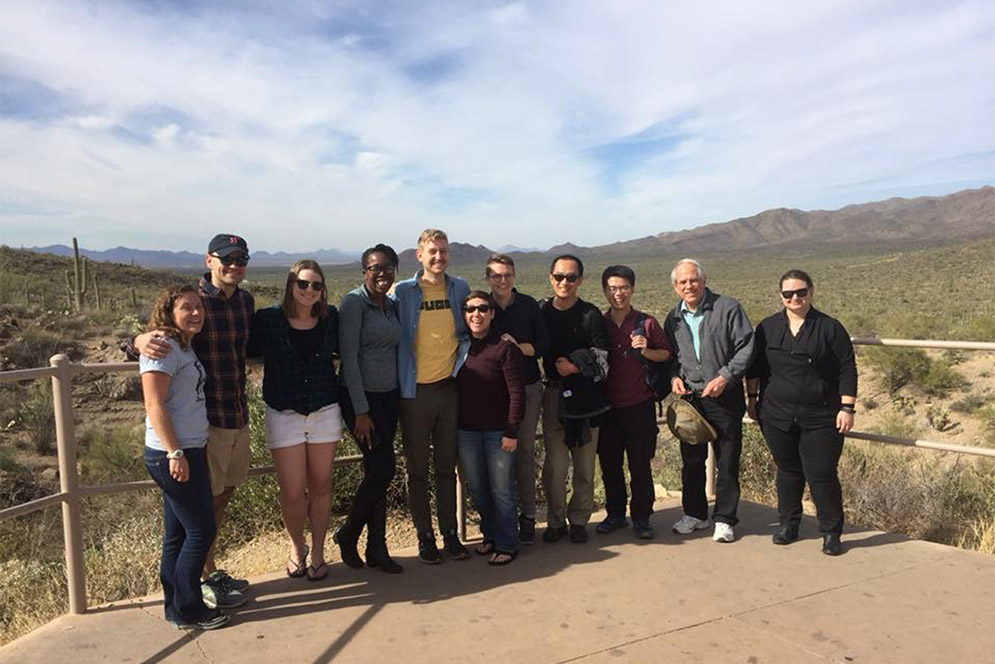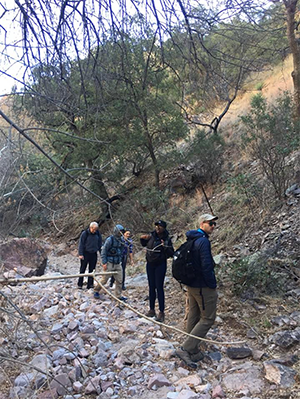STH Students Travel to US-Mexico Border to Learn Migrant Ministry
Travel seminar trip an education in the miseries facing immigrants

Students in STH’s Arizona/Mexico Border Seminar spent more than a week in Arizona and Mexico in January immersing themselves in the existence of migrants and those who minister to them. A second group will do the same next week over spring break.
- STH students travel to Arizona for immigration ministry study
- Desert hike, processing center visit expose them to migrant experience
- Second spring break trip coincides with DACA expiration
Among the many sad memories she took away from the Arizona desert, the saddest for Bailey Brawner were the “rape trees.”
During a 10-mile hike in the Arizona desert in January, along a route strewn with clothing left by Mexican migrants who’d risked this journey, Brawner (STH’18) learned from her guide about “rape trees,” hung with bras and undergarments: monuments to the many women who are sexually attacked on their journey across the border.
“Many times, they are hiking for three or more days at a time, with much less preparation and supplies than we had,” Brawner says. Many who challenge the summer temperatures of 100 degrees and higher wind up dead, “mostly from dehydration.”
Perhaps you’ve noticed that the country is having a dustup over immigration. Brawner certainly noticed, which is why she and eight other School of Theology students trekked the desert as part of STH’s Arizona/Mexico Border Seminar. A second group of 10 will participate in the seminar trip next week over spring break, immersing themselves to the extent possible in the existence of migrants and those who minister to them, via a weeklong stay in Arizona and one overnight at a Mexican nonprofit assisting poor women and children.

Next week’s trip comes the same month as the expiration of protection for immigrants brought here illegally as children—people, known as Dreamers, most Americans want to keep in the country. So the course, which has had to turn away student applicants since its inception in January 2015, has had even more interest than usual this year, requiring two sessions.
“I believe that has to do with the political climate and the conversation around immigration,” says Laura Rambikur (STH’17, SSW’17), the STH adjunct instructor who developed and leads the class. (While deportations remain below their peak under President Obama, arrests have surged.)
“The issue of immigration is front and center now, not just in American life but American religious life, especially for progressive Christians,” agrees Bryan Stone, E. Stanley Jones Professor of Evangelism and STH associate dean for academic affairs. “People are being mistreated because of their immigrant status.”
Besides the desert hike, students meet with operators of nonprofit groups that house immigrants in churches, as well as speak with Border Patrol agents about their work. The stop in Mexico includes visiting the wall on that side of the border, overnighting at an organization that offers meals and education to poor Mexican children, and visiting a shelter for the recently deported.
Brawner says that at the latter site, “I got to talk with Jorge, a 30-year-old father of four who had moved to Phoenix with his parents when he was just a teenager.” After 14 years in the States, immigration officials had picked him up just two days before, because he couldn’t afford to renew his work permit—an example, she says, “of many people who are abused by the incredibly broken immigration system.”
Micah Norman Pace (STH’18) was struck by the deportees’ stories of how much the cartels ferrying the undocumented into the United States charge migrants, who are “simply a commodity,” he says.
“The men we were speaking with said crossing can cost anywhere from $6,000 to $9,000, and that all of them were going to begin immediately preparing to cross again,” he says. “I asked them why it was such a no-brainer to come back, and the responses were simple: family and opportunity.”
Although Rambikur grew up in Arizona, it wasn’t until she went to Honduras before beginning graduate studies at BU that she truly appreciated the plight of immigrants. Working for a nonprofit there, she learned how policies at the US border affected Honduran colleagues trying to cross it, versus her own ease of travel because of what she dubs her “privilege cards”—white, born in the United States, able to vote.”
While still a graduate student, she pitched a new course that includes the travel seminar to Stone and the powers that be at STH, and it was approved. The first group made the trip in January 2015. Rambikur graduated last year, and this year became the course instructor.
She says the seminar has four themes to impart to students: “how race, power, and colonization continue to play a central role in border politics; how people’s lives”—including undocumented families, border patrol agents, and deported migrants—“are deeply impacted by the border; the reality of the desert; and finally, I want students to be able to wrestle with why theology matters” in this discussion.
Why does it? Borders “remind us that we live in a world that still places value on nation state–building and colonization,” says Rambikur. “As faith leaders, it forces us to ask the question: who is my neighbor, and why does it matter?”
The trip is one of several to other nations STH has run for almost a decade to introduce students to particular types of ministry, Stone says.

Comments & Discussion
Boston University moderates comments to facilitate an informed, substantive, civil conversation. Abusive, profane, self-promotional, misleading, incoherent or off-topic comments will be rejected. Moderators are staffed during regular business hours (EST) and can only accept comments written in English. Statistics or facts must include a citation or a link to the citation.